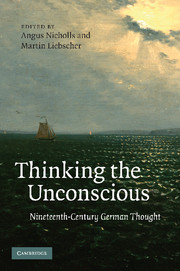Book contents
- Frontmatter
- Contents
- Notes on contributors
- Introduction: thinking the unconscious
- 1 The unconscious from the Storm and Stress to Weimar classicism: the dialectic of time and pleasure
- 2 The philosophical significance of Schelling's conception of the unconscious
- 3 The scientific unconscious: Goethe's post-Kantian epistemology
- 4 The hidden agent of the self: towards an aesthetic theory of the non-conscious in German romanticism
- 5 The real essence of human beings: Schopenhauer and the unconscious will
- 6 Carl Gustav Carus and the science of the unconscious
- 7 Eduard von Hartmann's Philosophy of the Unconscious
- 8 Gustav Theodor Fechner and the unconscious
- 9 Friedrich Nietzsche's perspectives on the unconscious
- 10 Freud and nineteenth-century philosophical sources on the unconscious
- Epilogue: the “optional” unconscious
- Works cited
- Index
- References
5 - The real essence of human beings: Schopenhauer and the unconscious will
Published online by Cambridge University Press: 04 August 2010
- Frontmatter
- Contents
- Notes on contributors
- Introduction: thinking the unconscious
- 1 The unconscious from the Storm and Stress to Weimar classicism: the dialectic of time and pleasure
- 2 The philosophical significance of Schelling's conception of the unconscious
- 3 The scientific unconscious: Goethe's post-Kantian epistemology
- 4 The hidden agent of the self: towards an aesthetic theory of the non-conscious in German romanticism
- 5 The real essence of human beings: Schopenhauer and the unconscious will
- 6 Carl Gustav Carus and the science of the unconscious
- 7 Eduard von Hartmann's Philosophy of the Unconscious
- 8 Gustav Theodor Fechner and the unconscious
- 9 Friedrich Nietzsche's perspectives on the unconscious
- 10 Freud and nineteenth-century philosophical sources on the unconscious
- Epilogue: the “optional” unconscious
- Works cited
- Index
- References
Summary
In The World as Will and Representation (Die Welt als Wille und Vorstellung, 1819 and 1844) Arthur Schopenhauer aims at a global metaphysics, a theory of the essence of the world as it is in itself. He calls this essence will (Wille), which, to put it briefly, he understands as a blind striving for existence, life, and reproduction. Human beings have the same essence as all other manifestations of will in the world, and this has several consequences for Schopenhauer's conception of humanity. Neither rationality, nor intentional action, nor consciousness is primary or foundational in human beings. The true core of the personality is not the self-conscious “I” or subject of knowledge, but rather the will, which is fundamentally blind and without knowledge, but which interacts with the intellect almost as an agent distinct from it. As we shall see, Schopenhauer makes a number of psychological observations about the interplay of intellect and will. These include the omnipresence of sexual desire in or beneath our experience; the persistence of desires and affects unknown to the self-conscious intellect; the will's capacity to prohibit representations in the intellect that are liable to arouse certain emotions; and the occurrence of madness when memories painful to the will are shielded from the intellect and arbitrary representations are substituted. In this paper I propose to elucidate and interrogate Schopenhauer's notion of will and its relation to ideas about the unconscious, with the aim of addressing its significance as an exercise in philosophical psychology.
- Type
- Chapter
- Information
- Thinking the UnconsciousNineteenth-Century German Thought, pp. 140 - 155Publisher: Cambridge University PressPrint publication year: 2010
References
- 1
- Cited by



